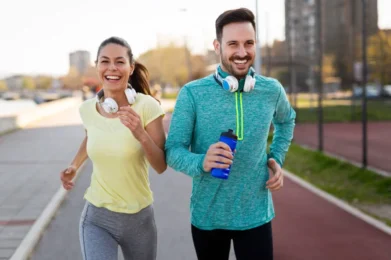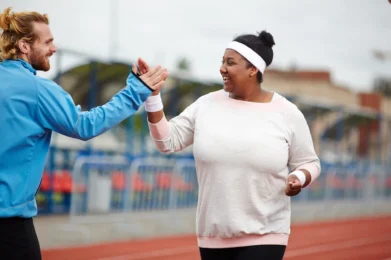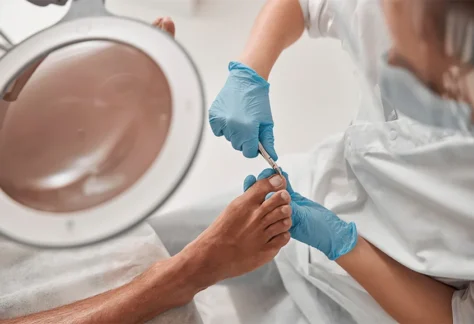In This Article:
- As restrictions lift, wear your mask over your nose and mouth any time you are in public. Do not touch your mask while you are wearing it. The more people wear masks, the more familiar and comfortable it will become.
- When running necessary errands, try to perform them quickly and with as few people as possible. Once you get home, wash your produce thoroughly and dispose of the packaging.
- Monitor your health, listen to your body and take extra care of yourself and your family. If you feel sick, stay home to avoid spreading the virus.
After several weeks of strictly-enforced stay-at-home orders and business closures, Arizona is taking steps to reopen. While it may be tempting to fall into our old social habits, it’s important to remember that it’s still not yet safe to return to our normal, pre-COVID routines. As a community, we all need to continue practicing social distancing and taking extra caution to keep ourselves and others safe and healthy – especially now that more people will be out in public.
Here are our top 10 tips for staying safe during this period of adjustment:
1. Continue wearing your face mask in public (if it is safe for you to do so)
The CDC has recommended most people wear face masks any time they go to a public space, such as a grocery store. However, face coverings shouldn’t be worn by anybody who has trouble breathing or is unable to remove their mask without help. Children younger than 2 years old should also not wear a mask.
2. Help slow the spread by making masks the norm
Face masks alone won’t prevent you from catching coronavirus from another person. However, wearing a mask will help you avoid unintentionally spreading the disease (or any germs in general). Remember that even if you aren’t showing any symptoms of illness, it’s possible that you could still be carrying the virus.
Wearing a face mask will also help destigmatize mask-wearing in public; in other words, the more people wear face masks, the more normal it will become, and everyone will feel more comfortable wearing them.
3. Don’t touch your mask once it’s on
The WHO recommends not touching or adjusting your mask while you’re wearing it. When you take off your mask, unhook/untie it from behind instead of pulling it off from the front. This will ensure you’re not exposing yourself to any germs.
4. Only leave the house for essential services
In order to keep yourself and others as safe as possible, you should still be limiting the amount of time you spend in public places. It may be tempting to go to the store out of boredom, but you should only be going if you absolutely need something.
Many stores are still offering curbside pickup and delivery services, so keep taking advantage of those services as much as possible to avoid going into stores.
5. Limit the number of people running an errand
The more people are in a public space at any given time, the higher the risk of spreading the disease. Run errands by yourself when you can, or at least limit the number of people you run errands with as much as possible.
6. Make your trips to the store as quick as possible
When you’re at the store, focus on finding the things on your shopping list and avoid spending extra time browsing. Learn how to shop efficiently, so you can get in and get out quickly.
7. Use the checkout option you’re most comfortable with
Many stores around the Valley offer self-checkout options in addition to regular checkout with an employee. If you’re wondering if it’s safer to use self-checkout, the answer is really up to you. When you use self-checkout, you have to touch a screen, but regular check-out forces you to interact with another person. The risk of sharing germs is about the same; it’s all a matter of what you’re comfortable with.
8. Don’t sort through produce with your bare hands
While the CDC hasn’t recommended wearing gloves while running errands, CNET advises against sorting through produce with your bare hands. If you don’t have gloves with you, you can stick your hand inside a plastic produce bag while sifting through the produce. This will prevent you from spreading or picking up germs from fruits and vegetables that other people have touched, and it may also encourage others at the store to do the same thing.
9. Don’t wash your produce in anything other than water
When you get home from the store, don’t wash your produce in disinfectants or soap. Doing so could put you at risk of ingesting the chemicals in the disinfectants. Wash your produce in plain water.
10. Keep taking care of your health
Last but certainly not least, keep monitoring your health and taking extra good care of yourself and your family. Regularly check your temperature and monitor yourself for signs of infection, such as fever, shortness of breath, or persistent coughing. If you feel sick at all, stay home.
Valleywise Health is here to guide you through these challenging times and keep our communities across the Valley as healthy as possible. To learn more or book a telehealth appointment, visit ValleywiseHealth.org or call 1 (833) VLLYWSE.
Sources:
- https://www.cdc.gov/coronavirus/2019-ncov/prevent-getting-sick/prevention.html
- https://www.who.int/emergencies/diseases/novel-coronavirus-2019/advice-for-public/when-and-how-to-use-masks
- https://www.aarp.org/health/healthy-living/info-2020/safety-grocery-shopping.html
- https://www.cnet.com/health/16-coronavirus-tips-how-to-help-keep-yourself-healthy-when-going-out-in-public/
- https://www.npr.org/2020/04/10/832131832/keeping-safe-while-grocery-shopping-during-the-pandemic
- https://www.nytimes.com/article/prepare-for-coronavirus.html






